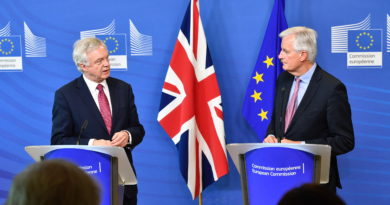How language frames political debate
However hazy we might find the phrase ‘Brexit means Brexit’ now, six years ago it would have been entirely meaningless. It wasn’t until the spring of 2012, after all, that the word ‘Brexit’ was first coined. Its first recorded use was when the think tank director – and prominent Remainer – Peter Wilding, used it in an article about the Eurozone crisis. It’s what’s known in linguistics as a blend – the result of a process whereby two words are fused together to create a new term. As a way of coining new words this is a very common process. In the last few years, for example, it’s given us such essential modern concepts as tweens, webinars, frenemies and sexting.
The model for ‘Brexit’ was, of course, the debate about Greece’s possible exit from the Eurozone, or ‘Grexit’; a word which was also first used in 2012. But although the component parts of both these words are directly analogous, the connotations they have are markedly different. Grexit was predominantly used as a warning over Greece’s political future should their economic crisis fail to get resolved. Brexit, on the other hand, has a far more equivocal meaning. While Greece was fighting to deal with its government-debt crisis, and actively trying to avoid Grexit, Britain’s split with the EU was the result of a pre-meditated decision. It was ‘democracy in process’, as we’re continually reminded. And, arguably, the word itself may have helped swing the decision.
How we perceive information
The reason it may have helped rather than hindered the Leave campaign is because of what is known, in cognitive linguistics, as ‘framing ’. This is an important notion for the way we perceive information. Take, for example, Richard Nixon’s famous assertion, ‘I’m not a crook ’. By using the word ‘crook’ in this context, Nixon ensured that this was the first idea that sprung to mind for his audience. He himself triggered the concept of nefarious behaviour by explicitly voicing the idea, thus achieving precisely the opposite of what he was intending to. If he’d framed his remarks differently, stressing what he considered positive attributes rather than denying (but thus naming) negative ones, the association wouldn’t have been burnt so deeply and directly into the public’s consciousness.
In the case of ‘Brexit’, what’s significant is that the word itself contains the idea of an ‘exit’. And conversely, it doesn’t include anything to do with remaining or with Europe. In other words, every time the term is used, the idea of exiting is triggered – and in this way is likely reinforced.
The ubiquity of ‘Brexit’ in public discourse has been such that at the end of 2016 Collins Dictionary chose it as their word of the year. In explaining their choice, a spokesperson argued that it was set to become as flexible and influential a term in political discourse as ‘Watergate’ has been. And that it would likely get adopted and adapted for any number of political ruptures and upsets in the future. (Most recently it’s been used for speculation that Secretary of State Rex Tillerson may soon resign, resulting in a Rexit .)
‘Brexiteers’, ‘Broflakes’ and other blends
Certainly, Brexit has already spawned dozens of other, related blends. And again, the connotations these produce, based on their structure, have proved to be an influential part of the discourse. The coining of the word ‘Brexiteer’, for example, was seen as an important strategic step for the Leave campaign. In early media reporting ‘Brexiter’ and ‘Brexiteer’ were both being used with equal frequency. But, as Michael Gove explained to Ian Katz in The Spectator, ‘Brexiteer brings to mind buccaneer, pioneer, musketeer… It lends a sense of panache and romance to the argument’. Adopting this as the default term for the movement thus added a swashbuckling edge to its identity. ‘Brexiteer’ stands in stark contrast to the term that had previously been used to describe the same position, the far more underwhelming and negative ‘Eurosceptic’.
Equally important for the post-referendum debate was the coining of ‘Remoaner’. In this case the blend – incorporating a suitably creaky pun – not only provides a label for one side of the debate, but also adds a touch of insult into the mix. This sort of tactic, both categorising and disparaging one’s opponents at the same time, has been used to great effect on both sides of the Atlantic in the last couple of years. Jonathon Green, a specialist in the history of slang, feels there’s been a notable upswell in the ‘vocabulary of vilification’ in the aftermath of Brexit and Trump’s victory. And the reason for this, he suggests, in an interview with the journalist Jessica Goldstein, is likely down to the increasing polarisation of political opinions that’s taken place in society of late.
Coining of a whole new vocabulary of political insult is a tactic that’s been a particular hallmark of the Alt-right. Terms such as ‘cuck’ and ‘snowflake’ have moved from margin to mainstream in American politics, and in certain cases have begun to get global traction. The word ‘cuck’ for example, despite having distinct racist and misogynistic overtones, broke through into the mainstream back in April of this year when Trump’s chief strategist Steve Bannon reportedly used it in a feud with Jared Kushner. Short for ‘cuckservative’, it’s another blend – this time of ‘cuckold’ and ‘conservative’ – and is used as a term of contempt for what the Alt-right see as mainstream conservatives who have some sympathy or tolerance for liberal values. Its origins are partly related to ‘cuckold porn’, which often involves a Caucasian man humiliated by having to watch his wife have sex with an African-American, and it’s this which gives it a particularly offensive ideological bent.
The term ‘snowflake’ has had even greater uptake. Used initially to refer to narcissistic and overly-sensitive millennials who supposedly lack the resilience and robustness of previous generations, its use gradually widened to include anyone complaining about perceived social injustices in the world. It’s now become something of a catch-all insult for liberals generally, and is so widespread that The Guardian named it as the defining insult of 2016.
As often happens with derogatory terms aimed at a particular community, there’s been a move to re-appropriate the word as a badge of pride by the very group it’s meant to vilify. In street demonstrations and on social media, the image of a snowflake is now used as a symbol of solidarity with left-leaning views. Then there’s the way the insult has been modified and turned back on those who first coined it. In the last few weeks the term ‘broflake’ has begun to spread, used to describe a reactionary man who is himself overly-sensitive of criticism, and is constantly finding offence in feminist or race-related activism which, he feels, is specifically designed to marginalise him and his kind.
The linguist George Lakoff suggests that in politics, when arguing against the opposition, you should never ‘use their language because it evokes their frame and not the frame you seek to establish’. Instead, he advises, pick your own words so you can reframe the conversation. This influence of word choice on the way that issues are framed extends right up to newly-coined words. Even those which are not designed to be specifically derogatory can still encode particular values and perspectives. This is sometimes by design, sometimes by accident. But either way it plays an influential part in the politics that shapes the key decisions of our lives.
Philip Seargeant
Dr Philip Seargeant is a Senior Lecturer in Applied Linguistics in the Centre for Language and Communication at The Open University. This article was originally published on the website Open Learn of the Open University, Milton Keynes, and is reproduced here with permission.
Photo: on the streets of Paris, courtesy of Alberto Santangelo © all rights reserved.




